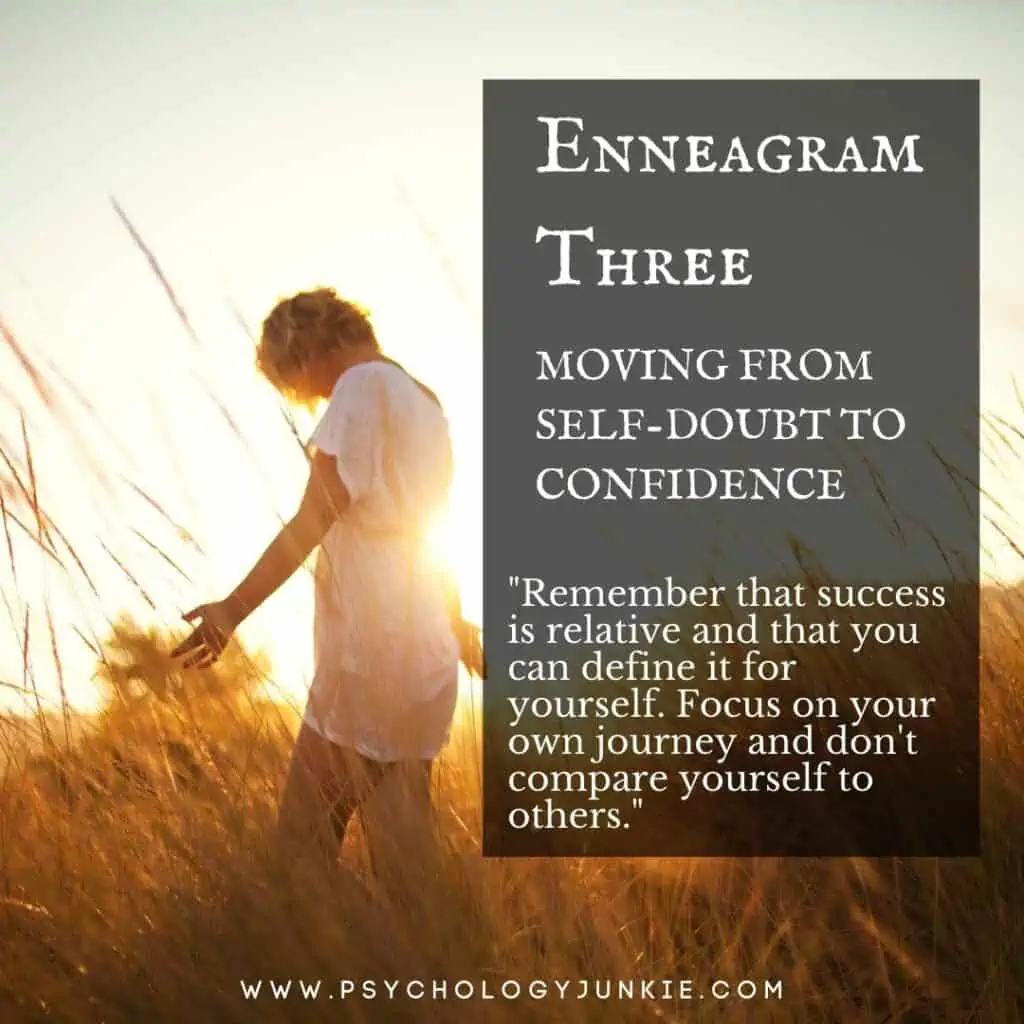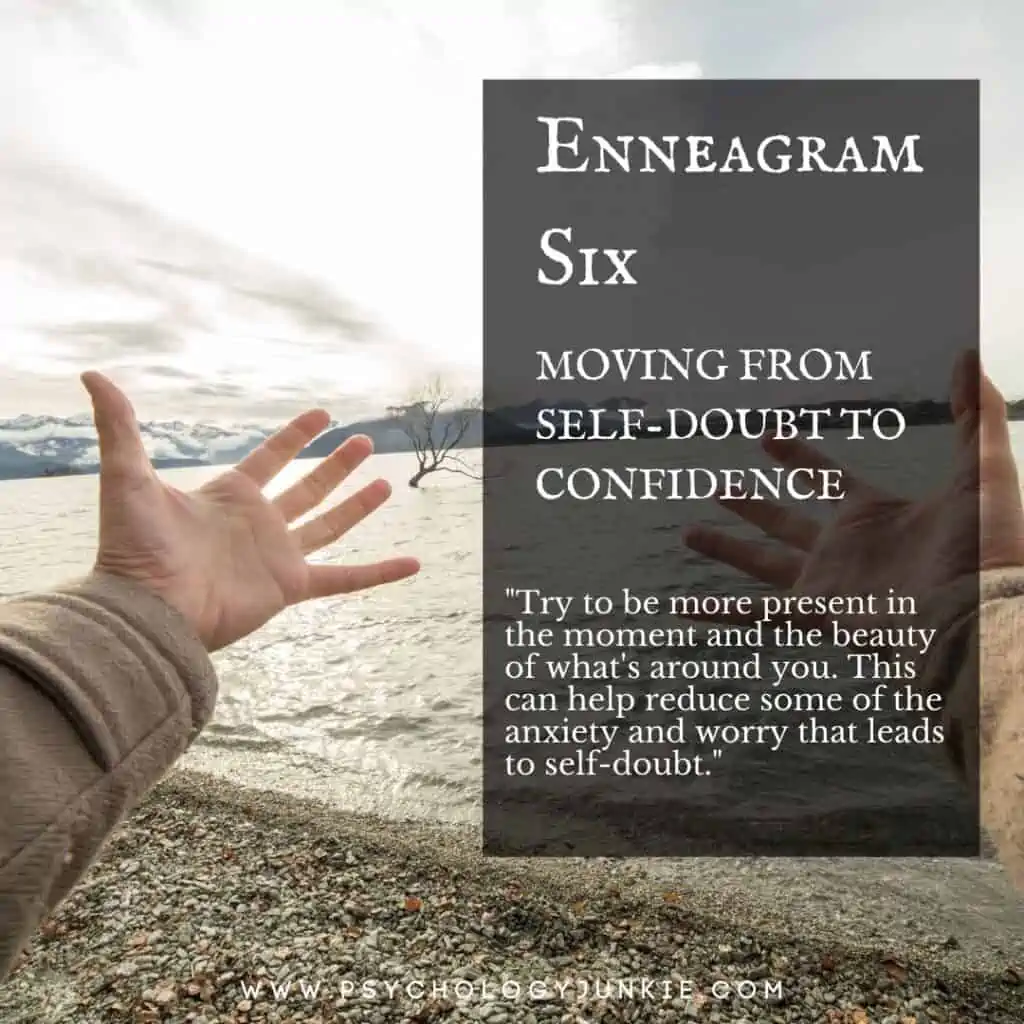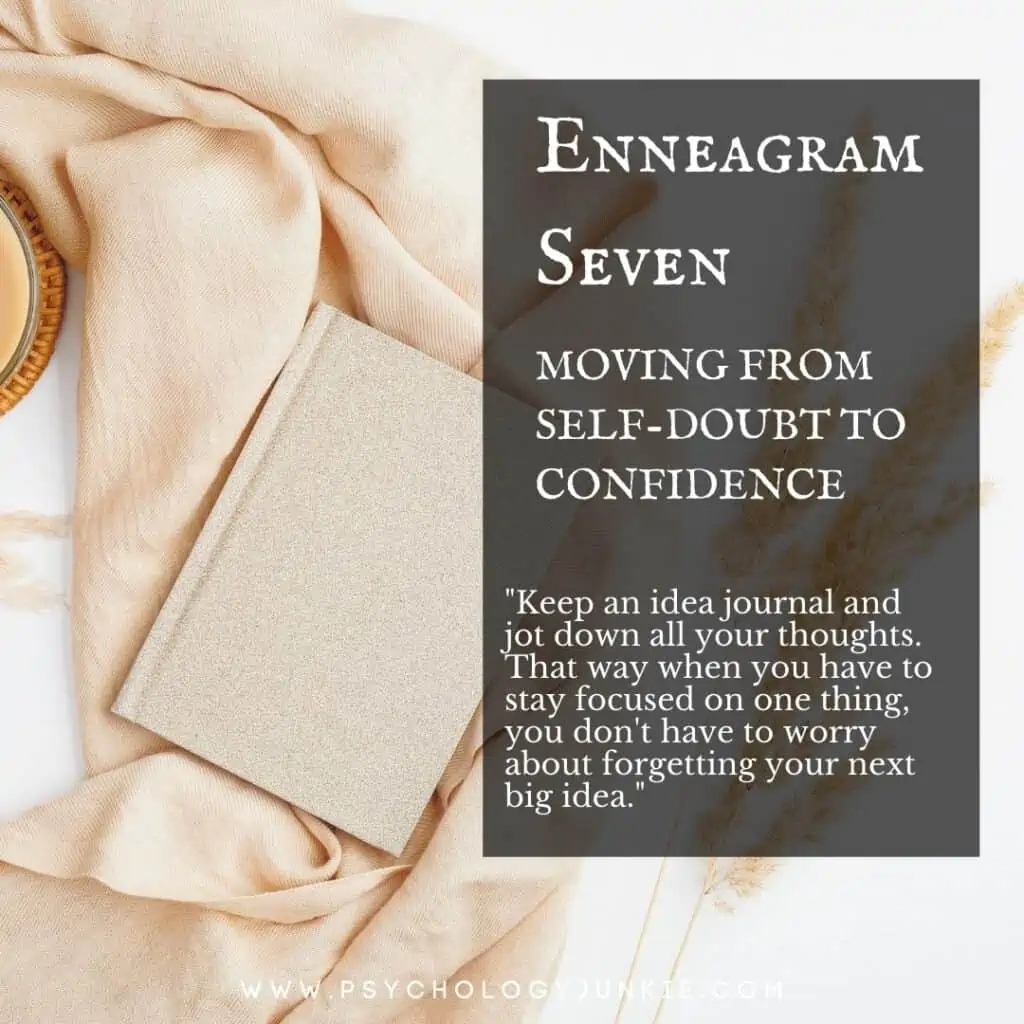How to Overcome Self-Doubt, Based On Your Enneagram Type
Self-doubt is something we all struggle with from time to time. But for some, it can be a more constant battle. If you find yourself doubting your abilities, questioning your choices, or feeling like you’re not good enough, it can be helpful to understand where that doubt is coming from.
Your personality type can play a role in how you experience and deal with self-doubt. Here’s a look at how each of the 9 Enneagram types can move past self-doubt into a more confident and balanced mindset.

Not sure what your Enneagram type is? Take our free questionnaire here!
Table of contents
Estimated reading time: 15 minutes
Enneagram 1

If you’re a type 1, perfectionism may be at the root of your self-doubt. You set high standards for yourself and others, and can be hard on yourself when you don’t meet those standards. You may feel like there’s no way you can do something as well as you imagined it or you may be continually frustrated or underwhelmed by the people around you. In fact, you may even avoid relationships because you feel you’ll inevitably be disappointed.
Here are some ways to push past self-doubt into a healthy and more open space:
- Take time for relaxation. I know, it feels silly and wasteful. But it’s crucial! Find a hobby that isn’t work related or a chore and prioritize it.
- Meditate to relax your body and mind.
- Listen to people who are sharing thoughts or ideas that contradict your own. Try to be open and fair and avoid making any assumptions.
- Give yourself time to play every day.
- When you find yourself frustrated with others for not doing things “right,” ask yourself why they might not have. Try to consider their point of view.
- Acknowledge your anger instead of stifling it. Write down your angry thoughts in order to get them out of your system. Punch a pillow. Find ways to let the tension out.
- Remember that your inner critic is not you and remember that it isn’t always right and that ultimately you get to decide what’s best for you.
Read This Next: The Enneagram 1 – The Perfectionist
Enneagram 2

As a type 2, you may doubt yourself because you’re constantly giving to others and putting their needs above your own. You may feel like you’re not doing enough or that you’re not good enough. You may not prioritize your own needs or desires because you feel like it’s “selfish” or you’ll let others down. This can lead to frustration, exhaustion, and resentment.
Here are some ways to push past self-doubt and get into a more healthy and balanced mindset:
- Start by acknowledging your own needs. What do you need in order to feel happy and fulfilled?
- Make time for yourself every day, even if it’s just a few minutes.
- Find a creative outlet that is just for you and prioritize it.
- Talk to a therapist or counselor who can help you understand your own needs and how to best take care of yourself.
- When you feel resentful, stop and figure out if there’s a boundary you need to put up so that you’re not over-giving or over-extending yourself.
- Practice saying “no” more often. Build up that muscle and skill so that you can set up healthy boundaries and avoid resentment and overgiving.
- Practice giving only when you expect nothing in return. Ask yourself, “Would I still want to do this if it wasn’t going to influence how they felt about me?”
- Spend time figuring out what your values are and what makes you happy and gives you a sense of meaning. How can you honor those values and desires every day? What boundaries do you need to put up to ensure that those values aren’t violated?
Read This Next: 21 Signs That You’re an Enneagram 2 Type
Enneagram 3

As a type 3, you may doubt yourself because you’re constantly striving for success. You compare yourself to others and feel like you’re falling short. You might feel like you’ll never achieve enough to be worthwhile. When you accomplish a task or pursue a project you might see the competition and feel disillusioned. At times, you can avoid vulnerability and openness in a relationship because you feel like it will make you appear weak.
Here are some ways to push past self-doubt and get into a more healthy mindset:
- Remember that success is relative and that you can define it for yourself.
- Focus on your own journey and don’t compare yourself to others.
- Find at least one person in your life that you can be 100% authentic with. Try to be as honest as you can with that person about everything and make it a goal for yourself.
- Take some time each day to check in with yourself and honestly assess how you’re feeling. You can write a journal entry, meditate, or just think about it.
- Do something generous or good in secret. This could be helping out at a soup kitchen, making bags of essentials for the homeless, or cleaning up the beach. Appreciate the depth and meaning that this gives to your life.
- Try to notice when you’re ignoring your physical or mental well-being because of your work or your drive for success. Try to see where you can make adjustments to honor your mind, body, and spirit.
- When you get negative feedback, let yourself exist with it for a while, but then remember that we all make mistakes. You aren’t more of a failure than anyone else because someone had criticism to give.
Read This Next: The Enneagram 3 Child
Enneagram 4

As a type 4, you may doubt yourself because you feel like you’re different from everyone else. You may feel like you don’t fit in or that you’re not good enough. You can feel so overwhelmed by your own emotions and the suffering that you see in yourself and others that you feel hopeless. You might believe that you’re fundamentally flawed and that there’s no fixing it.
Here are some ways to push past self-doubt and get into a more healthy mindset:
- Remember that everyone feels like an outsider at times. You’re not alone in your experience.
- Find people or a community who make you feel seen and accepted just as you are.
- Volunteer and serve in meaningful ways. This will help you to realize that no matter how much bad there is in the world, there is still beauty, generosity, and potential.
- Talk to a therapist who can help you understand and process your emotions in a healthy way.
- Take time to celebrate all the elements of your personality that you love. If you can’t think of things, ask people you love to help you see them.
- When you hit a roadblock on a creative pursuit, don’t give up! Remember that all the great artists and inventors have had failures and roadblocks.
- Remember that you can show up every day and make progress on your work even if you don’t feel like it. Don’t put your passion projects on the backburner because your passion is low (unless your values are against what you’re doing).
- Remember that there are no rules about who gets to be creative. You are innately creative and allowed to express that in whatever ways you want.
- Avoid fixating on old failures and wounds as a reason not to begin or continue something.
Read This Next: The Enneagram 4 – The Individualist
Enneagram 5

As a type 5, you may doubt yourself because you feel like you don’t have quite enough knowledge yet. You might have studied something for months but still feel like you need just a bit more information to begin something. Sometimes you can get so caught up in your own head and thinking about things that you forget to actually take action. When you do take action, you might overthink it and second-guess yourself so much that you get stuck in indecision.
Here are some ways to overcome self-doubt and get into a more healthy mindset:
- Remember that no one knows everything. We’re all just learning as we go along.
- Remember that the only way to really fully learn something involves doing.
- Make a decision and then commit to it. Once you’ve decided, don’t keep going back and changing your mind.
- Remember that you aren’t a cup that, once empty, is empty forever. If you’re afraid of putting too much energy into something or going out in the world, remember that your energy and resources will “refill.” This can resolve some of the anxiety you have around taking action.
- Try to be open to people and spending time with them. Set a percentage every week, even if it’s 1%. Try to be 1% more open to people and give 1% more of your energy to the people in your life. Gradually increase this number. Positive relationships will give you more balance and confidence as a person!
- Give yourself permission to fail or take risks. Remember that all the great artists, scientists, and innovators failed. In facts, without those failures they wouldn’t have been able to create the great things they did.
Read This Next: The Enneagram 5 – The Investigator
Enneagram 6

As a type 6, you may doubt yourself because you feel like you need to have all the answers before taking action. You might overthink things and try to plan for every possible outcome. This can lead to paralysis by analysis and prevent you from ever taking action. You might also have a lot of anxiety and worry, which can lead to self-doubt.
Here are some ways to overcome self-doubt and get into a more healthy mindset:
- Remember that you don’t need to have all the answers before taking action. Sometimes it’s okay to just take a leap of faith!
- Try to find one way to be spontaneous every day. Whether that means going for an impromptu drive or ordering something you normally wouldn’t, just do something without overthinking it.
- Try to be more present in the moment and the beauty of what’s around you. This can help reduce some of the anxiety and worry that leads to self-doubt.
- Practice meditation and mindfulness.
- Remember that your worries and thoughts aren’t always true. Many times we believe our anxieties and our worst-case scenario thoughts. But this worry can lead to stress which is hard on our bodies in the long run. Think of all the times a worry didn’t actually come true. Remind yourself of the security blankets and resources you have even if the worst were to happen.
- Take time to focus on your goals and what you want to achieve. This can help you to get out of your own head and focus on something positive.
- Give yourself a calming ritual to enjoy at the end of the day. You could drink a cup of hot tea and then soak in the tub or go for a relaxing walk. Use this time to calm your mind, center yourself, and enjoy the moment fully.
Read This Next: The Enneagram 6 – The Loyalist
Enneagram 7

As a type 7, you may doubt yourself because you feel like your attention is too scattered. You might worry that if you’re not doing something exciting or fun, then you’re wasting your time. The fear of missing out, being bored, or getting distracted and letting yourself down can stop you from beginning a project or task you really care about.
Here are some ways to move past self-doubt and get into a more balanced and healthy mindset:
- Remember that it’s okay to have moments of boredom or down time. Anyone who is responsible will be bored sometimes. In fact, sometimes boredom can reveal a deeper insight, a spark of inspiration, or simply allow you to get a task accomplished that’s important in the long run.
- Make a list of your priorities and what’s most important to you in life. This can help you focus on what really matters and let go of the distractions that are pulling you away from what’s most valuable.
- Find satisfaction in less. Remind yourself that all the material things you have now are things you once wanted desperately to have. If you keep seeking out more you’ll never have enough. But when you’re grateful for what you have, your life is plentiful.
- Keep an idea journal and jot down all your thoughts. That way when you have to stay focused on one thing, you don’t have to worry about forgetting your next big idea.
- Spend some time each day writing out your thoughts, fears, and feelings. This can help you to know yourself better and learn from your experiences.
- Set a goal to stick with something a certain amount of time before quitting or moving onto another thing. This could be an hour each day until it’s finished, or something similar!
- Keep a note of small joys throughout your day. This will help you amp up your satisfaction in life.
Read This Next: 7 Struggles of the Enneagram Seven Type
Enneagram 8

As an 8, you may doubt yourself when it comes to your relationships or being vulnerable and open about who you are. You might worry that you’re being taken advantage of, tricked, or that others will see you as vulnerable or weak. While on the outside you tend to appear strong and confident, on the inside you might be feeling insecure or self-conscious.
Some tips to help you move through self-doubt:
- Remember that being open and vulnerable does not make you weak. In fact, it can be a sign of strength. It takes courage to be open about who you are and what you’re feeling.
- Turn power into passion. Instead of trying to assert power over your environment, try to think about how you can take action and be a positive influence in your environment. Choose purpose over power. This can mean volunteering in your community, helping out, or talking about your values and sharing your causes.
- Remember that you have limits to your resources and that physical and mental self-care is crucial. Notice when you’re doing more than you should and pushing yourself past your limits.
- Take time to truly open up to someone you trust. Be 100% as authentic as you can be. Don’t be afraid to talk about your emotions, your childhood, or your feelings. This will probably be uncomfortable at first, but it is key to growing as a person.
Read This Next: The Enneagram 8 – The Challenger
Enneagram 9

If you’re a 9, you might doubt yourself because you fear conflict or being seen as difficult. You might worry that your opinions and needs don’t matter, or that you’ll be rejected if you express them. You might avoid taking action because you don’t want to make waves or upset the status quo. Sometimes you feel like it’s easier or better to stay in the background than assert your perspective or stand up for yourself.
Some suggestions for moving through self-doubt:
- Remember that you have valid opinions and that you’re entitled to express them. Just because you don’t voice them doesn’t mean they don’t matter.
- Start small by expressing your opinion on a minor issue. This can help you build confidence in yourself and your ability to communicate your thoughts.
- When you’re around people, try to notice when you’re censoring yourself. What are you afraid of saying? Why? See if you can challenge your beliefs about why it’s better to stay quiet.
- Make a list of your accomplishments, big and small. This can help you remember all the times you’ve been successful and helped others, which can boost your confidence.
- Remember that conflict is normal, and you will make it through. It’s okay to sit with conflict and allow it to do its work to improve your relationships and your life. An argument won’t end your relationship if it’s a good one. Saying “no” won’t destroy a friendship if it’s a worthwhile friend.
- Remind yourself that the people who love you actually care about what you want and what you have to say.
- Pause before saying “yes” right away. Instead say, “Let me think about this and get back to you!”
- Think about all the great leaders and inspirers in our world. Did they get uncomfortable? Think of people like Martin Luther King Jr., Gandhi, or Rosa Parks. One thing they all have in common is that they spoke up. You can do this too!
- Take time to assess and evaluate your values as a person. What matters to you? What do you feel strongly about? What makes you happy? Think about actions you can take to honor those values in your life.
Read This Next: Seven Struggles of the Enneagram 9 Type
What Are Your Thoughts?
Did you enjoy this article? Do you have any tips to share about self-doubt? Let us know in the comments!
Find out more about your personality type in our eBooks, Discovering You: Unlocking the Power of Personality Type, The INFJ – Understanding the Mystic, The INTJ – Understanding the Strategist, and The INFP – Understanding the Dreamer. You can also connect with me via Facebook, Instagram, or Twitter!














Hi Susan 👋 I am a 8 but once I learned what vulnerability meant I could understand it an learned to accept and love my vulnerability .I just don’t let wrong dark minded people take advantage of me or im my sacred space Beverly ISFP also 8 You are so amazing and awesome 👍👍
I have no idea what enneagram I am nor do I know how to find out. Why is this explained by enneagram in lieu of a personality type?